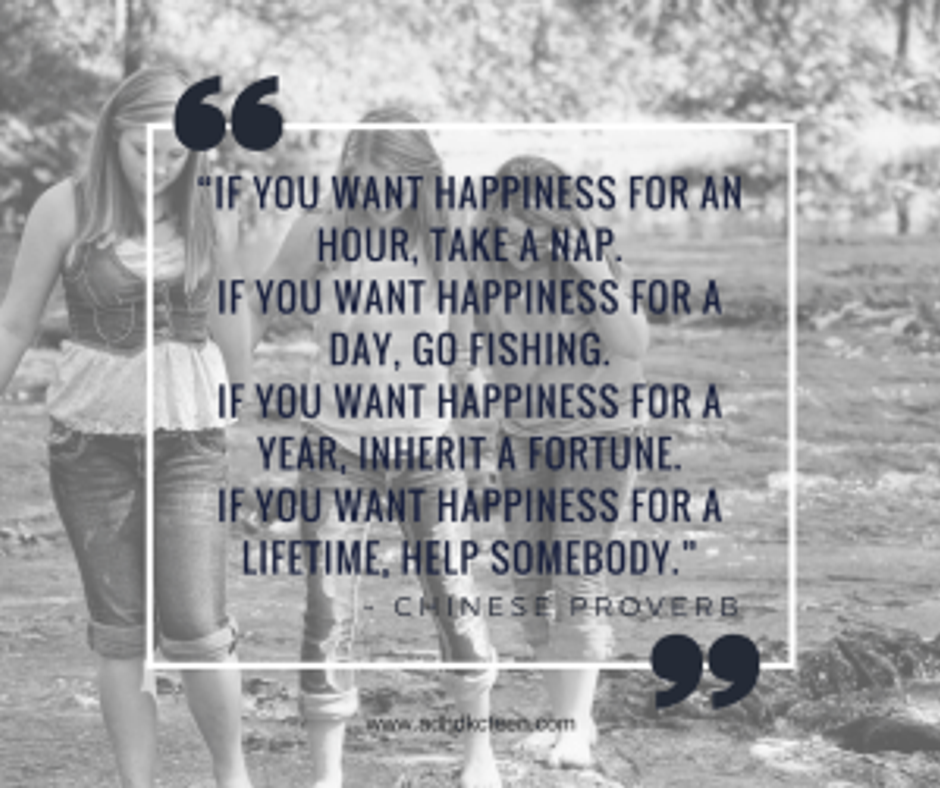Did you know that helping others has been proven to make us feel better? This is the final post in a series of ways to gain confidence and feel better. It’s my personal favorite. When kids are little they often have a hard time believing that it’s better to give than it is to receive, but most of us learn that it’s true somewhere along the way.

Source: NewAfrikan77
Find ways that you can make a difference for someone else. It can be big or small. Everything counts.
The one caveat is you should do it to help others, not to help yourself. Part of the magic of how it works is that we’re putting someone else ahead of ourselves.
Find a cause you’re passionate about and work for that cause. There are many. If you aren’t sure how to commit your time, try a few short term commitments out to see how they work for you.
Another thing to remember is that everything should be done in moderation. If you overextend yourself with too much to do, you will become overwhelmed and be unable to do anything well. Make sure you reserve time to do the things you need to do: school work, eating healthy, exercise, and sleep.
Choose service opportunities that are important to you. Don’t do things just because someone asks you to do it. It’s okay to say “no” if it’s not the right thing for you to do. If you do things that are not right for you, you will more likely resent what you’re doing instead of enjoying the many benefits of it.

Gain perspective.
Stress management and resilience can be gained by helping those in need. When you see how others live, you have a better perspective on your own life. You can learn empathy, compassion and solidarity with others.
Once you learn first hand about others, you can help to dispel common myths and prejudices.
Personal development.
One of the big ways we grow through volunteering is through personal development. When you branch out and do something for others, you learn about yourself.
You may recognize how your actions impact others by seeing how they benefit from what you’re doing.
Sometimes you learn about resilience by seeing others in unfortunate circumstances being strong.
Social skills can also be developed when you’re volunteering. You will most likely need to interact with other people when helping others. While being alone can lead to depressive thoughts, being with others can help us feel better.
Leadership roles might need to be taken, which involves strong organization and communication skills.
You might need to use teamwork to finish a project. Many projects require problem solving skills – and people with ADHD tend to be great problem solvers!
Studies show that when we help others with their stressful situations, we help our own emotion regulation skills and emotional well being.
Whatever skills you learn in your volunteer work, you can bring with you. It might spark an interest for a career or just help you in your daily life.
Feeling of community.
When you volunteer with others, you may gain new friends and make connections with your community.
If you’re working in an area that interests you, you will find others with similar interests.
You will meet people you might otherwise not have the opportunity to get to know. Finding things in common or things to value about one another can help you learn about yourself and about relationships.
Being part of a group of volunteers can help you feel a part of the community. That connection can build self confidence and a feeling of belonging.
Internal rewards.
Helping others and doing good just feels good. It makes us happy to make others happy.
Healthy body.
Volunteering means getting up and doing something. Too often we sit around and listen to music or play online. This isn’t good for our bodies.
Some volunteering is very active. If you’re cleaning an area, repairing or building a home or planting trees, you’re getting a lot of exercise.
Some volunteering is less physically active, but still active. Playing cards or bingo at a retirement center or stuffing envelopes is better than sitting in front of a computer.

Source: https://www.nationalservice.gov/vcla/demographic/teenagers
Need ideas to start helping others?
If you’re in the KC Metro and need help finding something to do, check out this Pinterest Board of KC Service Opportunities. Enjoy helping others!
5 Confidence Boosters:

Top 5 Self Confidence Boosters:
1. Stop Negativity 2. Be Positive 3. Finish Tasks 4. Self Care (The Big 3: Eat well, exercise, and sleep) 5. Help Others
I hope you’ve enjoyed this series. Please share it if you have, and comment on what you liked and didn’t like in it. What was missing? What has helped you the most over the years boost your self confidence?
.png)